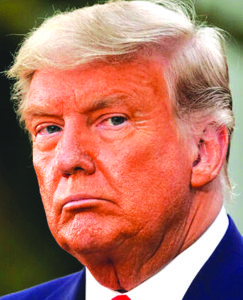November 27, 2020

A week after the election, President Trump asked advisers about options for a military strike against Iran, but did not approve any after the advisers argued a raid would inflame Middle East tensions during his last two months in office, according to The New York Times and The Wall Street Journal.
Trump explored the idea of a military strike against Iran after an inspection report from the International Atomic Energy Agency (IAEA) showed Tehran had increased the volume of enriched uranium it had on hand.
At a White House meeting November 12, Trump and members of his national security team discussed potential military and cyber attacks on Iranian nuclear targets, but aides warned him that “a strike against Iran’s facilities could easily escalate into a broader conflict in the last weeks of Mr. Trump’s presidency,” the Times reported.
Citing anonymous sources, the Times said officials left the meeting “believing a missile attack inside Iran was off the table.” However, the president made no decision not to attack. The issue was just left hanging.
The meeting included Vice President Mike Pence, Secretary of State Mike Pompeo, Acting Defense Secretary Christopher C. Miller, and Joint Chiefs of Staff Chairman Mark A. Milley. The Times said the main arguments against a raid were made by Pompeo and Milley. Its report did not indicate that anyone in the room supported an attack.
Some analysts suspect Trump is looking to end his presidency with a dramatic military strike against Iran that would limit the ability of President-elect Joe Biden to revive diplomacy with Tehran after he takes office January 20.
In Tehran, Foreign Ministry spokesman Saeed Khatibzadeh responded to the news reports by saying any American attack would result in a “crushing response” by the Islamic Republic, which is standard regime rhetoric.
The news reports did not say what specific targets were discussed. The most likely targets would be either the uranium enrichment complex at Natanz or the plant outside Esfahan that prepares uranium so it can be used in the centrifuges at Natanz. The loss the Esfahan plant would halt all enrichment. The loss of the Natanz site would reduce enrichment by about 85 percent because 85 percent of Iran’s operating centrifuges are located there.
Some in the media have been predicting Trump will start a war before his term is over. This is especially common in the British press, which has been forecasting an Iran-US war for four decades. But these war forecasts forget that Trump ran on a platform of stopping “endless wars” in the Middle East. To start one would threaten Trump with the loss of much support from what has been his base. On the other hand, a raid—such as his assassination of Maj. Gen. Qasem Soleymani last January—would likely increase his support within his base.
